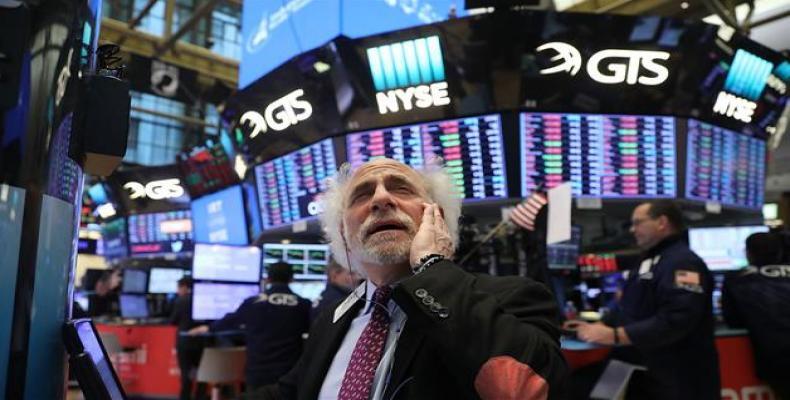New York, Feb 9 (RHC)-- U.S. stocks have plunged again with the Dow Jones industrial average experiencing a four-digit loss second time in a week due to fears of higher interest rates.
On Thursday, the Dow fell 1,032.89 points, or 4.15 percent, to 23,860.46. The Nasdaq Composite lost 274 points on the day, or 3.9 percent, to 6,777.16, while the S&P 500 closed with a 100-point loss, or 3.75 percent, to 2,581.08.
It was the second time in history the Dow has lost more than 1,000 points in a single day.
On Monday this week, the Dow suffered its biggest one-day point drop in history, plunging about 1,600 points during trading hours before recovering to close down at 1,175.
All the 30 companies that make up the Dow index were in the red on Monday, with Verizon, Microsoft, and Exxon Mobil each falling more than three percent.
Overall, the Dow has lost more than 2,000 points since January 26th. U.S. President Donald Trump on Wednesday said traders who are selling stocks are making a "big mistake" and they will regret their actions.
"In the 'old days,' when good news was reported, the Stock Market would go up. Today, when good news is reported, the Stock Market goes down," Trump tweeted. "Big mistake, and we have so much good (great) news about the economy!"
CNN Money's David Goldman said earlier this week: "Stocks have been rising steadily since the election in part because the US economy is strong. Given that U.S. unemployment is historically low, and there are more open jobs than people to fill them, companies are starting to pay workers more to retain existing employees and attract new hires. Businesses will eventually have to raise prices on the stuff they sell to afford their growing payrolls causing inflation. The Federal Reserve combats inflation by raising its interest rates."
A second reason is the increase of government-backed bond yields: stocks are a higher-risk investment than bonds, which are backed by the United States Treasury. If bond yields start to rise, investors will want to take some of their money out of stocks and put it into safer bonds, he added.


